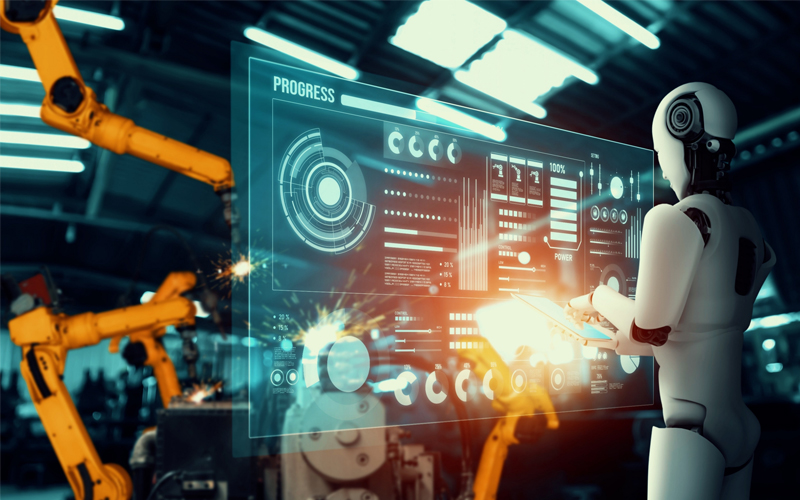As we approach 2025, the manufacturing industry is witnessing a monumental shift due to advancements in Artificial Intelligence (AI). AI-powered manufacturing automation is revolutionizing production lines, improving efficiency, reducing costs, and enabling greater flexibility. This transformation is driven by cutting-edge AI technologies that optimize every aspect of manufacturing, from supply chain management to predictive maintenance, quality control, and more. In this article, we will explore how AI is reshaping the manufacturing sector in 2025, its applications, benefits, and future potential.
AI Integration in Manufacturing: The Beginning of a New Era
Manufacturers have long relied on automation to enhance productivity and streamline operations. However, the introduction of AI into the manufacturing process takes automation to new heights, offering not just automated systems but intelligent systems capable of learning, adapting, and optimizing processes in real time. This new wave of AI-driven automation is changing the way companies approach business trends, creating smarter factories and more agile production environments.
The role of AI in manufacturing is expanding beyond traditional robots performing repetitive tasks. Today, AI-powered machines can analyze vast amounts of data, predict failures, optimize workflows, and even adapt to changes in production requirements. As we enter 2025, the potential for AI to enhance manufacturing processes is more significant than ever, providing manufacturers with the tools they need to stay competitive in an increasingly complex global market.
One of the key factors driving AI adoption in manufacturing is the increasing need for digital services and connected systems that can handle large-scale data processing and real-time decision-making. AI can process data faster and more accurately than humans, enabling companies to make informed decisions based on insights gleaned from the data.
AI Applications in Manufacturing Automation
AI is being used in a wide range of applications within the manufacturing sector, each improving efficiency, safety, and overall performance. Here are some key areas where AI-powered automation is having the most significant impact in 2025:
- Predictive Maintenance
One of the most transformative applications of AI in manufacturing is predictive maintenance. Traditional maintenance practices often rely on fixed schedules or reactive measures when equipment breaks down. However, AI allows manufacturers to predict when a machine is likely to fail by analyzing data from sensors embedded in equipment. These sensors track variables such as temperature, vibration, and pressure, sending real-time data to AI systems that can identify patterns and detect anomalies before they lead to failures.
With predictive maintenance, manufacturers can reduce downtime, increase the lifespan of their equipment, and minimize the need for costly repairs. AI-powered systems can automatically schedule maintenance when necessary, ensuring that production lines continue to run smoothly. For small businesses or startup ideas entering the manufacturing space, implementing predictive maintenance can save significant costs and improve overall operational efficiency.
- Supply Chain Optimization
AI is also playing a crucial role in optimizing supply chains within the manufacturing sector. Supply chain management involves managing a vast network of suppliers, distributors, and customers, which can be a complex and time-consuming task. By leveraging AI-powered systems, manufacturers can gain real-time visibility into their supply chains, track inventory, predict demand, and automate order fulfillment.
AI-driven supply chain automation can help businesses respond more quickly to changes in customer demand, reduce stockouts, and minimize excess inventory. Furthermore, AI can identify inefficiencies in the supply chain, allowing manufacturers to streamline operations and cut unnecessary costs. For instance, AI-powered systems can analyze historical data to forecast demand and optimize the procurement of raw materials. This kind of optimization is crucial for e-commerce businesses that rely on timely and efficient production processes to fulfill customer orders.

- Robotics and Smart Manufacturing
In 2025, robotics powered by AI is becoming increasingly prevalent on the factory floor. AI-powered robots are more adaptable and capable than traditional industrial robots, which were limited to performing repetitive tasks in fixed positions. Today’s AI-enabled robots can handle more complex tasks, collaborate with human workers, and learn from their environment to improve their performance.
Smart factories, powered by AI-driven robotics, can optimize workflows, enhance flexibility, and reduce the need for manual labor. These robots can autonomously adjust their actions based on real-time data, such as changes in production schedules or material availability. For instance, an AI-powered robot in a car manufacturing plant could learn to assemble different models based on changing specifications, adapting to the varying demands of the production line. By using AI-driven robotics, companies can achieve greater productivity and flexibility, making it easier to respond to changes in business trends and customer preferences.
- Quality Control and Inspection
Ensuring consistent product quality is essential in manufacturing. In the past, quality control involved manual inspection, which was both time-consuming and prone to human error. However, AI is changing the way quality control is approached by enabling automated inspection systems that can identify defects and inconsistencies at a much higher rate of accuracy than human inspectors.
AI-powered vision systems, using deep learning and computer vision, can detect flaws in products during the manufacturing process. These systems are capable of inspecting products in real time and making adjustments to the production line based on the feedback they provide. For example, in the electronics industry, AI-driven visual inspection systems can detect even the smallest defects in circuit boards, ensuring that only high-quality products are shipped to customers. For manufacturers, this means fewer defects, reduced waste, and higher customer satisfaction.
- Customization and Personalization
As customer demand shifts towards personalized products, AI is enabling manufacturers to offer more customization options. AI-powered systems can adjust production schedules and processes to accommodate the creation of custom products without disrupting overall production efficiency. By using AI to automate the customization process, manufacturers can offer a wide range of personalized products while maintaining profitability.
For example, in the apparel industry, AI can automate the creation of custom clothing items based on individual customer preferences, adjusting the design, fabric, and fit without significant delays. This ability to deliver highly personalized products on demand is a game-changer for businesses looking to tap into the growing demand for customization. Companies in industries like e-commerce innovations are particularly poised to benefit from this trend, as they can leverage AI to offer bespoke products while meeting tight deadlines.
- AI-Powered Data Analytics
AI’s ability to analyze and interpret vast amounts of data is transforming how manufacturers make decisions. With AI-powered data analytics, manufacturers can gain deeper insights into every aspect of their operations, from production efficiency to customer satisfaction. AI systems can identify trends, forecast demand, and optimize processes based on real-time data.
By implementing AI-powered analytics tools, manufacturers can make informed decisions that drive growth and improve performance. For example, AI can help identify bottlenecks in the production line, predict future demand, or uncover inefficiencies in the supply chain. This level of insight enables businesses to stay ahead of the competition, improve operational efficiency, and make data-driven decisions that align with long-term startup growth strategies.
The Future of AI-Powered Manufacturing Automation
The future of AI in manufacturing is incredibly promising. As AI technologies continue to evolve, we can expect even greater levels of automation and intelligence in manufacturing processes. Future advancements in AI-powered automation will further enhance the flexibility, efficiency, and sustainability of manufacturing operations.
By 2025, manufacturers will increasingly rely on AI and automation to stay competitive in an ever-changing market. Innovations in machine learning, robotics, and AI-powered analytics will enable manufacturers to optimize production lines, reduce waste, and offer more customized products to meet the demands of an increasingly diverse customer base.
In addition to the operational benefits, AI-powered automation in manufacturing will help companies become more sustainable. By using AI to optimize resource consumption, reduce energy usage, and minimize waste, manufacturers can meet sustainability goals and comply with increasingly stringent environmental regulations. This will be particularly important for industries focused on sustainable businesses, as AI can help them reduce their environmental footprint while enhancing efficiency.
Conclusion
AI-powered manufacturing automation is transforming the industry and driving the next generation of intelligent manufacturing. From predictive maintenance and supply chain optimization to quality control, robotics, and personalized products, AI is reshaping how manufacturers operate in 2025. As AI technologies continue to evolve, businesses will have the opportunity to further enhance their operations, improve efficiency, and stay ahead of the competition.
For companies looking to thrive in this new era of automation, embracing AI is no longer optional—it’s essential. Whether you’re a tech-based startup or a large enterprise, AI can help you optimize production, reduce costs, and create smarter, more efficient manufacturing processes. By leveraging AI, manufacturers can not only enhance their operations but also drive growth, innovation, and sustainability in an increasingly competitive global market.

